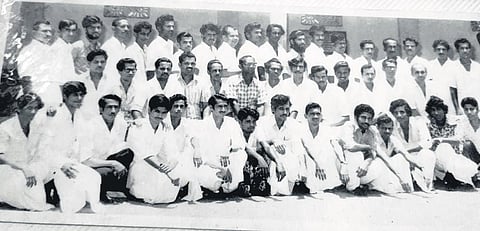

KASARAGOD: On January 3, 1976, when Pramod Bhat woke up from a three-day coma, he realised he was handcuffed to the headboard of the hospital bed. Three days before, on the New Year's Day, the 27-year-old farmer had led a group of 20 youths -- called the 'Bullet Batch' -- to protest against the Emergency and police brutality, in Kasaragod town.
"We were tired of police unleashing their brute force on peaceful protestors. So we changed tact and decided to hold on to the batons and ask them why they were beating us," said Bhat, now 73 years old. That day, he remembers holding on to one riot stick and telling the officer that he as acting against the law. "But before I could complete my sentence, I was repeatedly struck on the head by another police officer," he said.
The police then dragged a profusely bleeding Rao and other protestors into their vans and took them to the police camp in Vidyanagar. It was a torture camp of the police. "We were greeted by an ASP (assistant superintendent of police) named Achutharaman," he Rao recalled, running his fingers over the scar above his left eyebrow.
"I still remember him thundering, 'This is not Indira Gandhi's or Achutha Menon's land. This is Achutharaman's land, Here my writ runs'," Rao said. The officer, considered close to then home minister K Karunakaran was referring to the prime minister who imposed the Emergency, suspending civil liberties, and the then chief minister of Kerala.
The protestors were then stripped naked and caned. One police officer stomped on Rao's eye-glasses and broke them. "I don't remember much after that," he said It was a free for all, said V Raveendran, state secretary of the Association of Emergency Victims, and member of the 'Bullet Batch'. "Any police officer could walk in and kick on our backs with their boots or bang two heads of protestors against each other. Police hit some protestors on their penises with their lathis," he said.
Though the Emergency was declared on June 25, 1975, civil society and students started organising protests on November 14, the first prime minister Jawaharlal Nehru's birth anniversary, said Raveendran, a former BJP district president. Former Madhur Gram panchayat Madhava, who goes by a single name, recalled a protest he organised with 10 other activists of ABVP in Kasaragod Government
College in December 1975.
"We were pre-degree students. We wore Gandhi's badges on our shirts and raised slogans against Emergency on the campus," he said. A sub-inspector approached them and casually informed them that they were being arrested. The officer then walked the 11 students out. "When we stepped out of the college gate, there were around 10 jeeps. The officers did not waste any time and started mercilessly raining blows on us," said Madhava, who was then only 19 years old.
ALSO READ | Memories of the Emergency: A gritty rebel relives brutality of dark days
They were also taken to the police camp in Vidyanagar and ASP Achutharaman was there to welcome them. "He asked me my subject. I said economics, and he asked me about diminishing marginal utility. When I answered correctly, he asked me why I was part of these protests when I can study so well. He then abused my parents," he said.
One police officer then lowered his head by pulling his long hair down and another jumped on his back. "It was hippie culture and I had long hair," he said, laughing and rubbing his bald head. The 11 students were let off after a day but were hunted by the police. Madhava went into hiding and could not complete his education. After the Emergency, he did a teacher's training course and became a teacher in a primary school. Raveendran said around 8,000 persons were picked up and subjected to police brutality during the 19 months of Emergency. Around 800 persons were arrested in Kasaragod, which is the highest in Kerala. After Pramod Bhat recovered from the head injury, he was sent to Kannur central
prison.
"When I was in prison, around 60 police officers went to my house at Sadangaya. There was no road, so they walked 2km from Kuradapadav brandishing guns," he said.
On reaching his house, the police officers destroyed his crops, smashed and threw out the vessels in the kitchen, and dumped the dried areca nuts into a well. "My little cousin Ganapathi Bhat was there to enquire about me and he too was brutally beaten by the police," he said.
One month after the attack on his house, police arrested Ganapathi Bhat in a protest and ASP Achutharaman was taken aback. "The officer told my cousin he did not learn any lesson. My cousin replied, 'What was the purpose of living when police can come to villages and assault innocent people'," he said.
The twist of the time is Achutharaman, now 85 years old, is a senior functionary of the RSS, said Raveendran. "We see it as history's sweet revenge," he said.